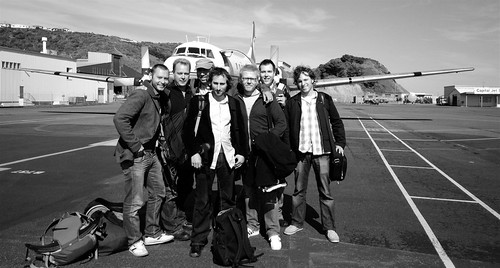The tourist is always the other guy

A few years ago, when the tide of war was shifting in Afghanistan, Northern Alliance troops began using a contemptuous moniker for the Pakistani, Uzbek, and Chechen militants who were fighting alongside the Taliban. “The [Afghan] people,” Alliance commander Ustad Mohammed Atta told TIME magazine, “want to kill these tourists.”
Not “terrorists”, mind you, “tourists”. Obviously, the pejorative sense of that word had come a long way since European elites first sneered at the English commoners who took Thomas Cook’s inaugural group tours in the 19th century.
Moreover, it seems we have come to the point where “tourist” — like “asshole”, or “politically correct” — has no meaning but the pejorative, and would never be a term anyone would apply to oneself. As John Flinn noted in his recent San Francisco Chronicle column, “among the status-conscious, the word ‘tourist’ has come to mean ‘anyone who travels in a style I consider inferior to the way I like to think I do it.'”
Or, as Evelyn Waugh put it a couple generations ago, “the tourist is always the other chap.”
Flinn goes on to make a good argument for dropping the tourist-traveler debate altogether — but somehow I doubt the travel milieu will ever lose its snarky obsession with “tourists”. An illustrative case in point would be that of travel writer Daisann McLane, who made a well-stated case for why we’re all “tourists” in a 2002 interview with World Hum. “We think a ‘traveler’ is cool, the ‘tourist’ is not,” she said, “and there’s a lot of snobbery attached to identifying oneself as the former. But I think we should let that go. We are all tourists. If you can afford a round trip ticket to Laos, and you go there for personal stimulation, not for a job, even if you end up staying for six months on the floor of a Hmong hut in a remote village, you’re still a tourist.”
This kind of logic might have been devastatingly conclusive were it not for the fact that McLane’s own column tagline at National Geographic Traveler was, “How to be a Traveler, Not a Tourist”.
As is the case with Anthony Bourdain (who I recently skewered for his similarly insipid Travel Channel promotion), I’d wager that this slogan was never McLane’s idea. Still, it points to the fact that — like a case of genital herpes — the tourist-traveler dichotomy will never go away, no matter how irritating it becomes.
The heart of this dichotomy, of course, lies in our own insecurities about travel. In the movie Fight Club, Edward Norton’s character, who has been crashing support-group meetings to boost his self-esteem, drops the t-word when another crasher, named Marla, starts showing up at the meetings. “Marla, the big tourist,” he mutters. “Her lie reflected my lie.” Similarly, we all travel with the knowledge that, by definition, a person journeying to a foreign place is an outsider, a dilettante, a superficial presence. Other travelers (i.e. “tourists”) only remind us of that fact.
And that’s why we go to such great pains to make distinctions and split hairs. Six years ago, while working on the set of Leonardo DiCaprio’s The Beach, I was amused to discover that 21st Century Fox’s handlers were dividing all the extras into two groups, “tourists” and “travelers”. No actual travel credentials were required; the production assistants simply made their decisions on the basis of fashion. That is, if you had dreads or wore a sarong or sported tattoos or clutched a set of bongos, you were grouped together with the “travelers”. If kept your hair short or wore nice clothes or had a reasonably neat appearance, you spent your on-camera time as a “tourist”. Though my suntan was lacking at the time, I made the cut as a “traveler” on the basis of my hair (which was longish) and clothing (which, while not suitably ethnic, was a bit tattered).
Despite such reductive methodology, however, I’ll admit I felt a small flush of pride as I took my place in the extras’ tent with the other “travelers”. Just like being picked first for a game of kindergarten kickball, I had proof that I had made the cut: I was a member of the elite.
Ultimately, the rhetoric of tourists and travelers is not just trapped in the rituals of human vanity; it has become hopelessly mixed up in the postmodern wash. After all, Paul Fussell and David Brooks have gone so far as to make fun of the people who make fun of tourists (Fussell calls them “anti-tourists“; Brooks calls them “travel snobs“) — and it’s only a matter of time before someone else writes a rant making fun of the people who make fun of the people who make fun of tourists.
When this happens, I know I’ll have my bases covered, since no less an authority than 21st Century Fox has already determined that I am a traveler. That is, not a tourist.

Category: Rolf Potts